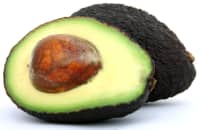Avocado (Persea Americana Mill.) is a native fruit of Central and South America.[1]
Composition
Avocados are rich in fat (approximately 15% by wt.).[1:1]
Avocados contain predominantly monounsaturated fatty acids (MUFA; 9.6% by wt.), which represent 62.8% to 63.6% of the total fatty acids found in avocados, with a predominance of oleic acid.[1:2]
The oil consists of approximately 71% MUFAs, 13% polyunsaturated fatty acids, 16% saturated fatty acids, fiber, vitamin B, vitamin K1, vitamin E, magnesium, potassium, and phytochemicals such as carotenoids, phenolics, and phytosterols.[1:3]
Healing Properties
Antiinflammatory
Chronic avocado oil ingestion reduces C-reactive protein.[2]
Antioxidant
Avocado oil has a wide variety of lipophilic antioxidants, which may decrease ROS production in renal mitochondria.[1:4]
Blood Health
Chronic avocado pulp treatment improves anti-platelet and anti-thrombotic activities.[2:1]
There are acute benefcial properties of polyunsaturated and monounsaturated fatty acid from avocado on glycemic and vascular markers during an acute postprandial challenge in middle-aged, overweight or obese subjects.[2:2]
Cholesterol Levels
The high concentrations of MUFAs in avocado suggest that an avocado-rich diet results in beneficial effects on blood lipids.[1:5]
Chronic avocado oil ingestion reduced triglycerides and LDL and VLDL cholesterol.[2:3]
The inclusion of one fresh avocado per day in a moderately fatty diet supports an improvement in cholesterol levels.[2:4]
High Cholesterol (hypercholesterolemia)
8 weeks supplementation with avocado oil (450 and 900 mg/kg/day) partially improved the lipid profile (lower LDL and triglycerides and higher HDL) and increased the activity of the Krebs cycle.[1:6]
Antiobesity
Supplementation with hydroalcoholic extracts of the fruit (100-mg/kg body weight) for 12 weeks reduced weight gain (24.77%) and BMI (17.92%).[1:7]
Insulen sensitivity
Body weight reduction and improved insulin sensitivity were observed in rats fed a sucrose-rich diet and supplemented with 10–30% avocado oil for 8 weeks.[1:8]
Heart Health
Chronic ingestion of aqueous avocado leaf extract is benefcial in improving cardiovascular parameters.[2:5]
Blood Pressure
Chronic avocado oil consumption has beneficial effects on cardiovascular physiology, including lowered systemic blood pressure, reduced renal reactive oxygen species, improved renal endothelium-dependent vasodilation and kidney mitochondrial function, suggesting that avocado positively interacts with the angiotensin system in regulating blood pressure.[2:6]
Heart Disease
Atherosclerosis
Decreases the risk of atherogenic plaque formation.[1:9]
Exercise
Avocado pulp prior to aerobic exercise improves a number of cardiovascular and autonomic variables during recovery in healthy females.[2:7] This outcome supports the advantageous efects of avocado pulp prior to exertion, suggesting the benefcial use of avocado before exercise.[2:8]
Liver Health
Treatment with an aqueous extract of avocado (100 and 200 mg/kg) protects against hepatic toxicity.[1:10]
- It reduces the activity of the liver enzymes aspartate aminotransferase and serum alanine aminotransferase and decreased serum bilirubin levels.[1:11]
Kidney Health
Chronic avocado oil consumption reduced renal reactive oxygen species, improved renal endothelium-dependent vasodilation and kidney mitochondrial function, suggesting that avocado positively interacts with the angiotensin system.[2:9]
Disease / Symptom Treatment
Diabetes
Helps control glycemia.[1:12]
Title: Ginger and avocado as nutraceuticals for obesity and its comorbidities
Publication: Wiley Online Library: Phytotherapy Research
Date: January 2020
Study Type: Review
Author(s): Natalia dos Santos Tramontin, Thais F. Luciano, Scherolin de Oliveira Marques, Claudio T. de Souza, Alexandre P. Muller
Institution(s): Universidade do Extremo Sul Catarinense, Criciúma, Brazil; Federal University of Juiz de Fora, Juiz de Fora, Brazil
Copy: archive, archive-mirror ↩︎ ↩︎ ↩︎ ↩︎ ↩︎ ↩︎ ↩︎ ↩︎ ↩︎ ↩︎ ↩︎ ↩︎ ↩︎Title: Avocado (Persea americana) pulp improves cardiovascular and autonomic recovery following submaximal running: a crossover, randomized, double-blind and placebo-controlled trial
Publication: Nature: Scientific Reports
Date: July 2020
Study Type: Human Study: In Vivo
Author(s): Fernando H. Sousa, Vitor E. Valenti, Leticia C. Pereira, Rafaela R. Bueno, Sara Prates, Amanda N. Akimoto, Mojtaba Kaviani, David M. Garner, Joice A.T., Amaral & Luiz Carlos de Abreu
Institution(s): University Health Center ABC, Santo Andre, SP, Brazil; Sao Paulo State University (UNESP), SP, Brazil; Oxford Brookes University, Oxford, UK; Acadia University, Wolfville, NS, Canada
Copy: archive, archive-mirror ↩︎ ↩︎ ↩︎ ↩︎ ↩︎ ↩︎ ↩︎ ↩︎ ↩︎ ↩︎
